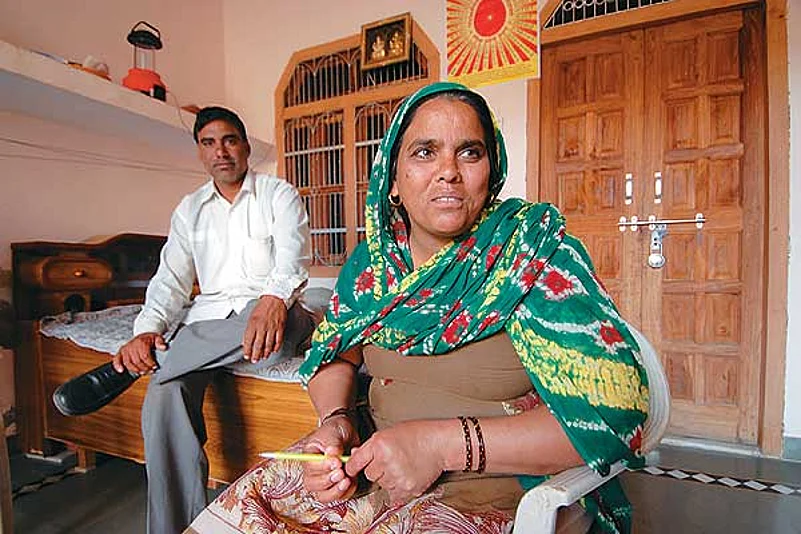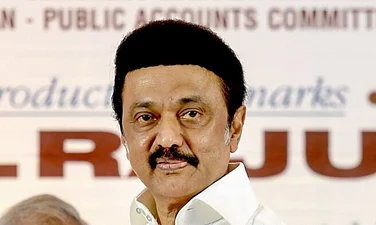Good Grades
- There are 12 lakh woman political representatives in panchayati raj institutions across the country
- Of these, only 17 per cent are above 50 years of age
- Two-fifths are 21-35 years of age
- Proportionately more female representatives are in the younger age groups than their male counterparts
- The majority of woman representatives in panchayat institutions have completed at least middle school
***
With her head covered in deference to elders, 40-year-old Geeta Chaudhury, a Std VIII dropout from Jaguvas, a village in Rajasthan’s Alwar district, about 170 km from Delhi, is amused and saddened by the pitched battle in Parliament over the women’s reservation bill. The twice-elected sarpanch catches television moments when she gets the time from tending to her domestic chores and attending to her duties as village head.
She has a simple question for those who oppose a quota for women in the Lok Sabha and the assemblies: Shouldn’t women, who comprise half the population, be allowed to have a say in the legislation process? Why is it, she asks, that men fear their power will diminish if they share it with women?
Geeta contested from a reserved seat after the state government, in adherence with the 73rd amendment, reserved 33 per cent seats for women in panchayats. That was in 1995. She had looked to her husband for support. He stood by her.
Five years later, she lost an election, but contested again this year and won—this time on a general seat, beating her nearest rival, Ajit Singh, by 36 votes. Over the years, she has changed. “Five years in office has given me the confidence to contest even from the general category,” she says.
In the din over the women’s reservation bill, the success of women like Geeta is forgotten. The fact that there are already 1.2 million elected women representatives, with many having proved their mettle more than once in the institutions of local self-government, has not been given due importance. Or focus. “From deciding on what to cook every day to discussing allocations of money for village projects, demanding primary schools and healthcare centres, I am capable of taking decisions now,” says Geeta. “I can walk up to any official and put forward the demands of my village.”
In Gadoj, a neighbouring village, Khajani Devi, a former sarpanch and Dalit, says that, having tasted political power once, she is loath to let go of it. “I’ll fight again after five years,” she says, standing by a ‘Sarpanch’ signboard outside her house. “I’ll have to append ‘purva’ (former) to the sarpanch board,” she says in a voice tinged with regret. But she quickly reels off her achievements, from fixing the power supply to her village to improving sanitation.
What motivated these two women to plunge into local politics? So that they could address problems like alcoholism among men and gender discrimination.
A nationwide survey of elected women representatives in panchayati raj institutions of 23 states conducted by AC-Nielsen ORG-MARG two years ago showed reservation has played a significant role in facilitating women’s entry into politics. Eighty-two per cent of those surveyed perceived an improvement in the respect they commanded in the village and 91 per cent felt they received greater recognition across various caste groups and didn’t face conflicts after being elected. States like Tamil Nadu have even taken the step of securing the term of the women sarpanches for 10 years.

Leading light Safia Khan, chief of the Alwar zilla parishad
However, it’s not as if there are no negatives. The survey revealed that in states like Uttarakhand, Goa, Karnataka, Tamil Nadu, Punjab, Rajasthan and Bihar, more than 10 per cent of the woman heads reported they often felt ignored just because they were women. And though a majority of elected representatives (85.8 per cent) were first-timers, only 14.3 per cent of them managed to win the second or third time.
There has also been criticism of the manner in which panchayati raj has been abused. The husbands of women sarpanches—there’s even a coinage for them, sarpanchpatis—are often the de facto heads, acting as power-brokers and forcing their wives to be no more than rubber stamps. “What do we do? Our wives are not educated!” says Jilla Ram of Ghatta village, also near Alwar, whose wife, Savita Devi, won on a general seat this year. In the enthusiasm to fill seats for women, many unlettered women are being persuaded to contest by their husbands and male relatives, who take over after the elections are over.
Rashmi Goyal, a project leader from Hunger Project, says that in a district like Alwar, with over 192 women sarpanches, at least in half the cases it’s the sarpanchpati who wields power.
It is here that the administration plays a crucial role. The collector of Alwar, Kunjilal Meena, shot off a notice on March 3 to the panchayats, ordering the men out of decision-making. “Illiteracy is a big hurdle but I hope things will improve,” he says. “We are also initiating training programmes.” His order to keep males out carries the threat of punitive action.
But Mani Shankar Aiyar, former Union minister for panchayati raj, feels too much is being made of husbands wielding power. “In a society like ours, the presence of male relatives is bound to be there in politics too,” he says. “So while women may have their entry smoothened by male members of the family, their eventual success depends on their own performance.” Aiyar feels the focus should be on what India has achieved in gender empowerment, which is on a scale without precedent in history, without parallel in these times.
At the same time, Aiyar says it cannot be denied that women’s empowerment in India can be likened to an unfinished building. “The ground floor had been built but the roof was yet to be placed on the structure—and that is happening now,” he says. “Women have given proof of their mettle in taking decisions from their panchayati raj experience, even if that evidence is not sought of their male counterparts. Now, we need their participation in lawmaking.”
Naysayers might perhaps heed what Safia Khan, pramukh of the Alwar zilla parishad, says: “The power gives us the confidence to work with the public. It helps being a literate woman. Even in a patriarchal society like Rajasthan, they listen.” As zilla pramukh, she works with 11 MLAs (including her husband), four MPs, and 14 other pradhans.


























